Questões de Língua Inglesa do ano 2003
Lista completa de Questões de Língua Inglesa do ano 2003 para resolução totalmente grátis. Selecione os assuntos no filtro de questões e comece a resolver exercícios.
When considering learner autonomy and teacher development, Jeremy Harmer says that:
"However good a teacher may be, students will never learn a language or anything else unless they aim to learn outside as well as during class time. This is because language is too complex and varied for there to be enough time for students to learn all they need to in a classroom. (...) As David Nunan suggests, not everything can be taught in class (Nunan 1988a:3), but even if it could a teacher will not always be around if and when students wish to use the language in real life (Cotterall 1995:220).
To compensate for the limits of classroom time and to counter the passivity that is an enemy of true learning, students need to develop their own learning strategies, so that as far as possible they become autonomous learners. This does not always happen automatically. Attitudes to self-directed learning are frequently conditioned by the educational culture in which students have studied or are studying (...)" (p.335). We can infer that:
- A.
teachers will always encounter passive resistance if they attempt to impose self-directed learning inappropriately;
- B.
depending on the cultural context the student finds himself/herself in, autonomy of action is not always considered a desirable characteristic;
- C.
students will be equally successful as autonomous learners because learning styles do not vary;
- D.
even the less enthusiastic learner is likely to continue studying on his/her own after the course has finished;
- E.
if a student signs a 'learner contract' with his / her teacher, he / she will learn everything during class time.
Read the following passage and choose the option that best answers the questions 01 to 05.
"The amount of time it takes" (line 12) to master a new structure is related to:- A. the learner's previous exposure to that structure;
- B. the teacher's ability to link forms to their stylistic use;
- C. the teacher's ability to expose structures as a progressive process;
- D. the learner's accuracy in formulating hypotheses;
- E. the learner's ability to link forms to functions.
Read the following passage and choose the option that best answers the questions 01 to 05.
"The experienced teacher" (lines 23-24):- A. will not be too worried if a pupil starts to make errors in a previously taught grammar item;
- B. understands that the learning process is predictable;
- C. will wait for their pupils to master a certain structure if it has been accurately exposed;
- D. will induce their students to provide information about the communicative use of language structures;
- E. disregards contextualization of grammar structures.
Read the following passage and choose the option that best answers the questions 01 to 05.
"Learners" (line 20):- A. must refer to their mother tongue when testing hypotheses;
- B. acquire grammatical knowledge little by little;
- C. learn better if they learn inductively;
- D. only master a structure if they have an insight about it;
- E. contextualize structures when they write stylistic texts.
Read the following passage and choose the option that best answers the questions 01 to 05.
One of the aims of teaching grammar:- A. seems to be making learners stop making errors;
- B. has to do with the speed of the learning process
- C. seems to be informing the learners about the communicative use of language structures;
- D. has to do with sociolinguistics;
- E. has been in question for the past few years.
Língua Inglesa - Interpretação de Texto - Centro de Seleção e de Promoção de Eventos UnB (CESPE) - 2003
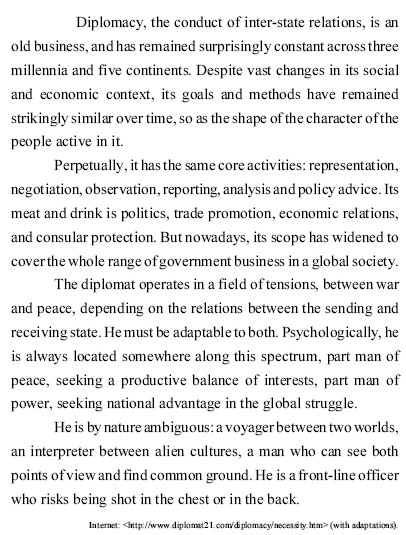
It can be inferred from the text I that
diplomatic concerns are restricted to intra-state relations.
- C. Certo
- E. Errado
Língua Inglesa - Interpretação de Texto - Centro de Seleção e de Promoção de Eventos UnB (CESPE) - 2003
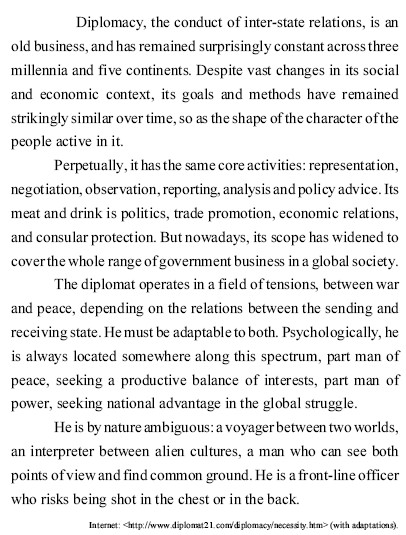
It can be inferred from the text I that
diplomacy has been present all over the world for centuries on end.
- C. Certo
- E. Errado
Língua Inglesa - Interpretação de Texto - Centro de Seleção e de Promoção de Eventos UnB (CESPE) - 2003
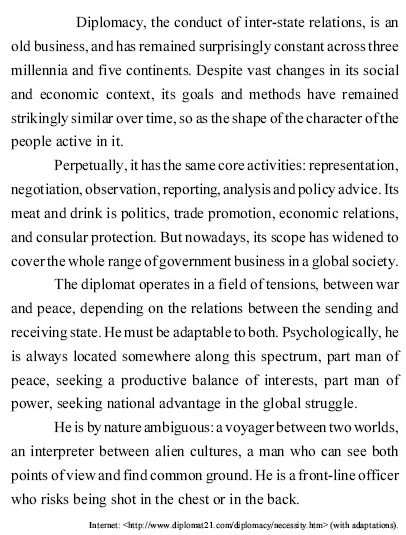
It can be inferred from the text I that
diplomacy has never experienced any kind of changes in its activities.
- C. Certo
- E. Errado
Língua Inglesa - Interpretação de Texto - Centro de Seleção e de Promoção de Eventos UnB (CESPE) - 2003
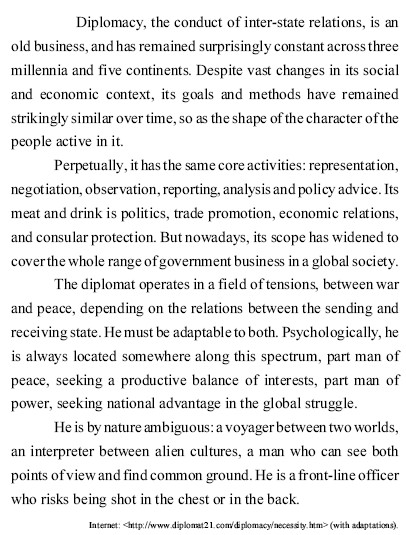
It can be inferred from the text I that
diplomatic activity includes political advice.
- C. Certo
- E. Errado
Língua Inglesa - Interpretação de Texto - Centro de Seleção e de Promoção de Eventos UnB (CESPE) - 2003
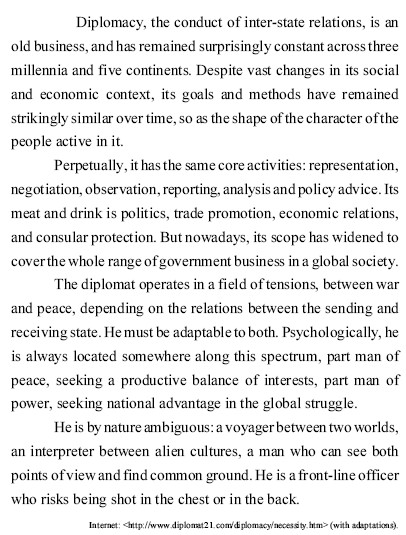
It can be inferred from the text I that
the diplomat is always subject to tensions, having to decide between war and peace.
- C. Certo
- E. Errado


